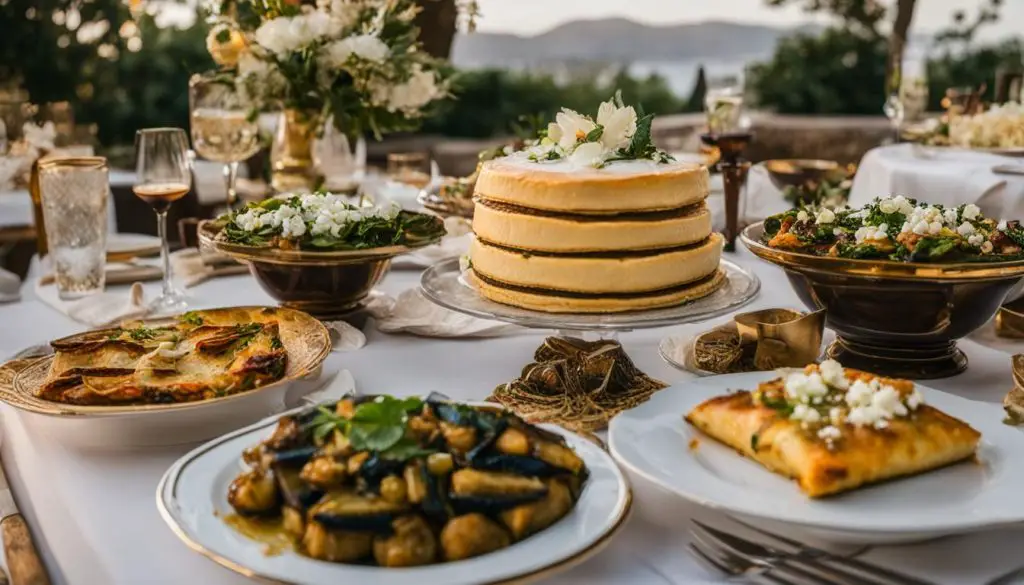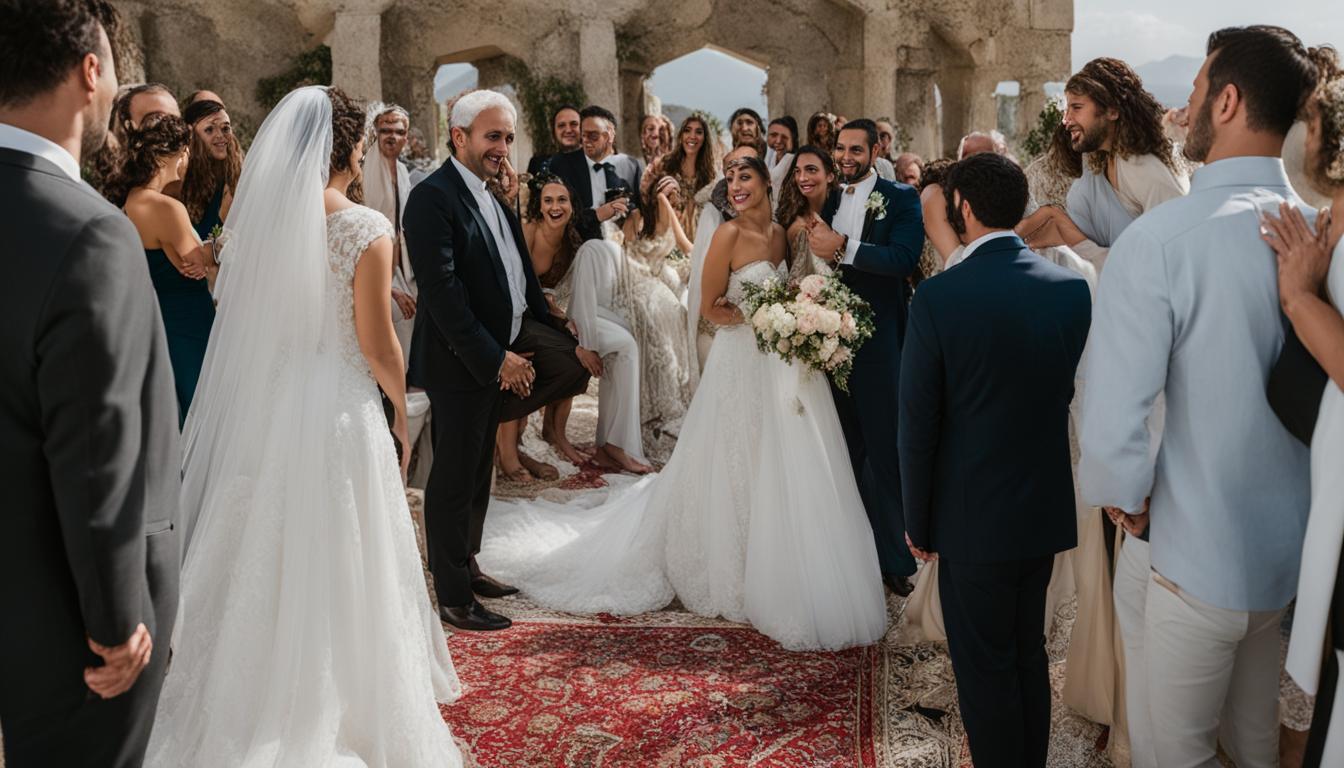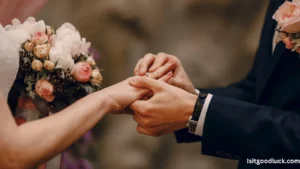Greek weddings are vibrant celebrations filled with ancient customs and traditions that have withstood the test of time. From engagement rituals to wedding ceremonies, these cultural practices play a significant role in shaping the entire celebration. One such tradition that has piqued curiosity is the act of spitting on the bride for good luck. Let’s delve into the significance of this intriguing custom and explore other fascinating traditions in Greek weddings.
Contents
Key Takeaways:
- The act of spitting on the bride in Greek weddings is believed to ward off the evil eye and protect her from negative energy and bad luck.
- Greek weddings are a blend of ancient traditions and religious rituals, reflecting the cultural and religious beliefs of the Greek people.
- Pre-wedding rituals, such as the preparation of the wedding bed and shaving of the groom, add a meaningful touch to the wedding celebration.
- Greek wedding feasts are renowned for their extravagant displays of traditional cuisine, including dishes like yuvetsi and baklava.
- The Kalamatiano and Zembekiko dances, along with the dollar dance, are popular features of Greek wedding festivities.
The Significance of Spit and Superstitions in Greek Weddings
In Greek culture, spitting on the bride is believed to ward off the evil eye, a malevolent curse cast by envy or jealousy. The act of spitting is seen as a symbolic way to protect the bride from any negative energy or bad luck on her wedding day. This tradition is deeply rooted in the belief that the evil eye can bring harm or misfortune to the newlyweds. By spitting on the bride, family and friends are showing their support and ensuring her wellbeing as she begins her married life.
Greeks have a strong belief in superstitions and rituals, which often influence wedding customs. These traditions, influenced by both religious and cultural factors, play a significant role in shaping the entire wedding celebration. The act of spitting on the bride is just one example of the various superstitious practices observed in Greek weddings.
Alongside spitting, there are other interesting customs and beliefs surrounding Greek weddings. For instance, it is common for the bride to wear a red ribbon or pin on her wedding gown. This is believed to protect her from evil spirits. Wedding guests may also wear a small charm or a blue bead, which is said to bring good luck and protect against the evil eye.
Overall, Greek wedding traditions are deeply rooted in cultural and religious beliefs. The act of spitting on the bride and other superstitions are believed to bring good luck, protect the couple from negative energy, and ensure a happy and prosperous marriage. These customs add depth and meaning to the wedding celebration, making it a memorable and cherished event for all involved.
Greek Wedding Customs and Traditions
Greek weddings are a fascinating blend of ancient customs and cultural traditions that have been passed down through generations. These rituals, deeply rooted in Greek heritage and Orthodox Christianity, add a unique and meaningful touch to the wedding celebrations.
Engagement Ceremony
Before the wedding, Greek couples traditionally have an engagement ceremony called “To Proxenio.” This event brings together the families of the bride and groom to announce their commitment and exchange gifts. It is a joyful occasion where the couple seeks the blessings and approval of their families, marking the beginning of their journey to marriage.
Pre-Wedding Rituals
Greek weddings involve various pre-wedding rituals that symbolize purity, fertility, and good luck. One notable custom is the shaving of the groom by his best man, known as “Thrinos.” This act signifies a fresh start and cleansing as the groom prepares to enter married life. Additionally, friends and family gather to help the bride get ready, a tradition called “Proikosmisi.” This is a special bonding moment filled with laughter, music, and anticipation for the beautiful bride.
Wedding Ceremony
The wedding ceremony itself is filled with rich symbolism and religious rituals. One iconic tradition is the ceremonial exchange of wedding crowns, known as “Stefana.” These crowns, joined by a ribbon, are placed on the couple’s heads to symbolize their union and the creation of a new kingdom, their marriage. The couple is also led in circles around the altar, representing their first steps together as a married couple in the presence of God.
Throughout the ceremony, prayers, hymns, and blessings are recited by the priests, creating a sacred and spiritual atmosphere. The wedding vows are exchanged, and the couple is pronounced husband and wife, sealing their commitment to each other in front of their loved ones.
| Custom | Meaning |
|---|---|
| Shaving the groom | Symbolizes a fresh start and cleansing |
| Exchange of wedding crowns | Signifies the couple’s union and the creation of a new kingdom |
| Circle around the altar | Represents the couple’s first steps together as a married couple |
These customs and traditions in Greek weddings create a rich tapestry of love, spirituality, and cultural heritage. They bring joy and depth to the celebration, making it a truly memorable event for the couple and their families. Greek weddings are a testament to the beauty of tradition and the power of love.
Greek Wedding Feast and Celebrations
Greek weddings are known for their lavish feasts and lively celebrations. The joyous occasion is filled with traditional Greek cuisine, vibrant dances, and unique customs that make the wedding festivities truly memorable.
The wedding reception is a culinary extravaganza, showcasing the rich flavors of Greek cuisine. Guests are treated to a delectable spread of dishes that highlight the country’s culinary heritage. From succulent lamb or beef stew with orzo, known as yuvetsi, to savory cheese pastries called tiropita, every bite is a tantalizing experience for the taste buds. And let’s not forget about the sweet finale – baklava, a honey and nut pastry, is a crowd favorite that adds a touch of indulgence to the celebration.
As the night unfolds, the dance floor comes alive with traditional Greek dances. The Kalamatiano and Zembekiko dances, performed by both young and old, create an atmosphere of joy and celebration. These rhythmic dances are a testament to the spirit of togetherness and unity that weddings symbolize.

The Dollar Dance: A Fun Tradition
One of the most enjoyable customs at a Greek wedding is the dollar dance. During this lively affair, guests take turns pinning money onto the attire of the newlyweds while dancing with them. This festive tradition is a way for guests to show their love and support for the couple as they embark on their journey together. The pinned money is often collected and used to help cover the wedding expenses or to start the couple’s new life.
A Table Full of Love and Celebration
In a Greek wedding feast, the atmosphere is filled with warmth and love. Family and friends come together to celebrate the union of two souls, creating memories that will be cherished for a lifetime. The tables are adorned with decorative elements, flowers, and candles, reflecting the beauty and elegance of the occasion. It is a time of unity, laughter, and heartfelt speeches, as loved ones share heartfelt wishes and blessings with the newlyweds.
| Traditional Greek Dishes | Description |
|---|---|
| Yuvetsi | A flavorful lamb or beef stew cooked with orzo pasta |
| Tiropita | A savory pastry filled with cheese |
| Baklava | A sweet pastry made with layers of phyllo dough, honey, and nuts |
In Conclusion
Greek wedding festivities are a harmonious blend of delicious food, spirited dances, and heartfelt traditions. From the mouthwatering dishes that showcase the flavors of Greece to the lively dances and customs that symbolize love, unity, and celebration, a Greek wedding feast is an unforgettable experience for all who attend. It is a time of joy, connection, and the creation of lasting memories as two families come together to honor the union of two souls.
Conclusion
Greek weddings are a celebration of rich traditions and cultural practices that have been passed down through generations. These customs, rituals, and superstitions make Greek weddings truly unique and reflect the deep-rooted beliefs of the Greek people.
From the act of spitting on the bride for good luck to the ceremonial exchange of wedding crowns, every aspect of a Greek wedding holds symbolic significance. These traditions create a meaningful and festive atmosphere, celebrating love, unity, and the rich cultural heritage of Greece.
Whether it’s the preparation of the wedding bed, the shaving of the groom, or the serving of delicious traditional Greek cuisine, each element of a Greek wedding is carefully curated to honor the couple and their journey into marriage. These customs not only bring joy and excitement to the occasion but also reinforce the strong bond between family and friends.
So, if you ever have the opportunity to attend a Greek wedding, embrace the vibrant traditions, savor the mouthwatering dishes, and join in the lively dances. Immerse yourself in the cultural richness of these celebrations and create memories that will last a lifetime.
FAQ
Do Greeks actually spit on the bride for good luck?
Yes, in Greek culture, spitting on the bride is believed to ward off the evil eye and protect her from negative energy or bad luck on her wedding day.
What is the significance of spitting at Greek weddings?
Spitting is seen as a symbolic way to protect the bride from the malevolent curse known as the evil eye, which is cast by envy or jealousy.
What other customs and traditions are there in Greek weddings?
Greek weddings are filled with traditions such as engagement ceremonies, preparation of the wedding bed, shaving of the groom, the exchange of wedding crowns, and the symbolic attire of the bride.
What kind of food is served at Greek weddings?
Traditional Greek cuisine is often served at wedding receptions, including dishes like yuvetsi, tiropita, and baklava.
What are some of the festive celebrations at Greek weddings?
Wedding guests often perform traditional Greek dances like Kalamatiano and Zembekiko, and there is a symbolic dollar dance where guests pin money onto the couple’s attire to congratulate them.





